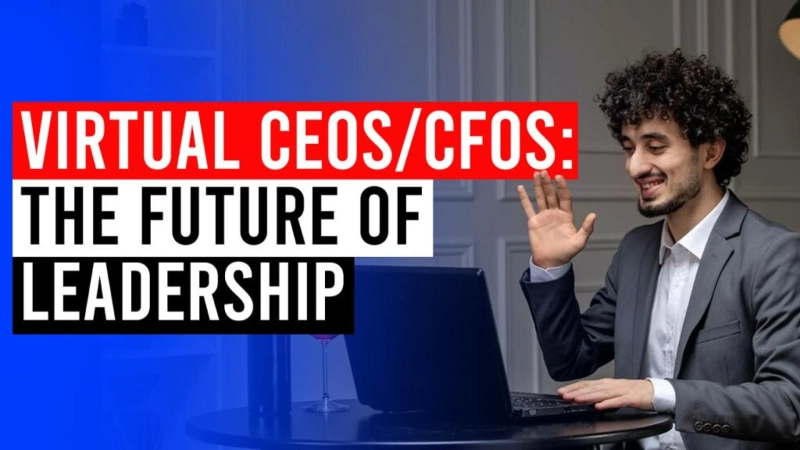Introduction
In today's era of businesses and startup, the concept of Virtual CEOs and CFOs is gaining significant traction. These leaders operate digitally, steering companies through the strategic and operational challenges. Let's explore how expertise of CEOs and CFOs can be utilized through virtual means.
The Rise of Virtual Leadership
The emergence of virtual leadership can be attributed to two major reasons:
Remote Work Revolution
The rise of virtual leadership is intricately linked to the global shift towards remote work. The traditional office setup is making way for decentralized teams, fostering a new era of leadership where physical proximity is no longer a prerequisite.
Also read: How can Hiring a Virtual CFO become a gamechanger for you?
Technological Advancements
Advancements in technology have played a pivotal role in enabling virtual leadership. From virtual meetings to collaborative platforms, the tools available today empower CEOs and CFOs to operate seamlessly across geographical boundaries.
Benefits of Virtual CEOs/CFOs
With virtual CEO/CFOs companies can enjoy following benefits:
Cost Efficiency
One of the significant advantages of virtual leadership is cost efficiency. Virtual CEOs and CFOs can operate without the need for physical office spaces, resulting in substantial savings for the organization.
Global Talent Pool
Operating virtually opens the door to a global talent pool. Companies can tap into diverse skill sets and perspectives, fostering innovation and driving growth.
Flexibility and Work-Life Balance
Virtual leadership allows for greater flexibility, promoting a healthier work-life balance. This flexibility can lead to increased job satisfaction and improved overall well-being.
Challenges and Solutions
Communication Barriers
While virtual leadership brings numerous benefits, communication can be a challenge. Overcoming language barriers, time zone differences, and ensuring effective communication are key areas that need attention.
Building Team Cohesion
Creating a cohesive virtual team requires intentional efforts. Virtual CEOs/CFOs must implement strategies to foster collaboration, trust, and a sense of belonging among team members.
Cybersecurity Concerns
The digital landscape comes with its share of risks, especially concerning cybersecurity. Virtual leaders need to prioritize robust cybersecurity measures to protect sensitive data and maintain the trust of stakeholders.
Qualities of Successful Virtual Leaders
Qualities of a successful virtual leader are no different than a normal leader. Some of these qualities are:
Adaptable
Virtual leaders must be adaptable in the face of rapid changes. For a person to lead the organization in the right direction, requires a mindset that embraces innovation, flexibility, and the ability to pivot when necessary.
Communication Skills
Effective communication is the cornerstone of virtual leadership. Virtual CEOs/CFOs must excel in conveying ideas, providing clear guidance, and fostering open communication channels.
Tech Savvy and Innovation
Being tech-savvy is a non-negotiable trait for virtual leaders. Embracing innovation and staying updated on technological advancements are essential in today's time.
Emotional Intelligence
Understanding and being aware of the emotions of a virtual team is crucial. Virtual leaders with high emotional intelligence can build strong relationships, even in the absence of face-to-face interactions.
Tools and Technologies for Virtual Leadership
Project Management Tools
Implementing robust project management tools is essential for virtual leaders. These tools streamline workflows, enhance collaboration, and ensure efficient project execution.
Communication Platforms
Choosing the right communication platforms is a critical decision for virtual leaders. From video conferencing to instant messaging, these tools facilitate seamless interactions among team members.
Risks and Mitigations
Legal and Compliance Issues
Dealing with legal and compliance issues in a virtual environment requires diligence. Virtual CEOs/CFOs must stay informed about regulations in various jurisdictions and implement measures to ensure compliance.
Data Security Measures
Addressing data security concerns is paramount. Virtual leaders must invest in robust cybersecurity measures, including encryption, secure networks, and employee training on cybersecurity best practices.
Future Outlook
Evolution of Virtual Leadership
The trajectory of virtual leadership indicates a continued evolution. As technology advances and businesses embrace virtual models, the role of virtual CEOs and CFOs is likely to become even more prominent.
Impact on Traditional Leadership Models
The rise of virtual leadership is reshaping traditional models. Companies are reevaluating their leadership structures, embracing flexibility, and leveraging the benefits of virtual leadership.
How to find a Virtual CEO/CFO for my Organization?
Finding a Virtual CEO/CFO for your organization is crucial as it requires someone with the right skills to oversee the financial landscape. A competent leader can ensure strategic financial management, effective decision-making, and sustainable growth.
Consulting firms, such as Master Brains, specialize in providing experienced virtual leaders who bring a wealth of expertise to guide your organization. Their services encompass strategic financial planning, risk management, and overall leadership, offering a tailored solution to meet your specific needs and drive your organization towards success.
Conclusion
In conclusion, identifying virtual CEOs/CFOs and navigating the future of leadership require a nuanced understanding of the benefits, challenges, and evolving trends. Success in the virtual realm hinges on qualities like adaptability, effective communication, and leveraging the right tools and technologies.
# FAQs
How can virtual leaders build a strong team culture in a remote setting?Creating a strong team culture virtually involves regular communication, team-building activities, and fostering a sense of belonging through virtual channels.
What role does emotional intelligence play in virtual leadership?Emotional intelligence is crucial in virtual leadership as it helps leaders understand and navigate the emotions of team members, fostering strong relationships.
How can companies ensure data security in a virtual leadership setup?Ensuring data security involves implementing robust cybersecurity measures, including encryption, secure networks, and comprehensive employee training.
Are there specific industries where virtual leadership is more prevalent?Virtual leadership is becoming prevalent across various industries, with technology, finance, and consulting being notable adopters.
What are the key technologies shaping the future of virtual leadership?Artificial intelligence, blockchain, and advanced communication platforms are key technologies shaping the future of virtual leadership.


